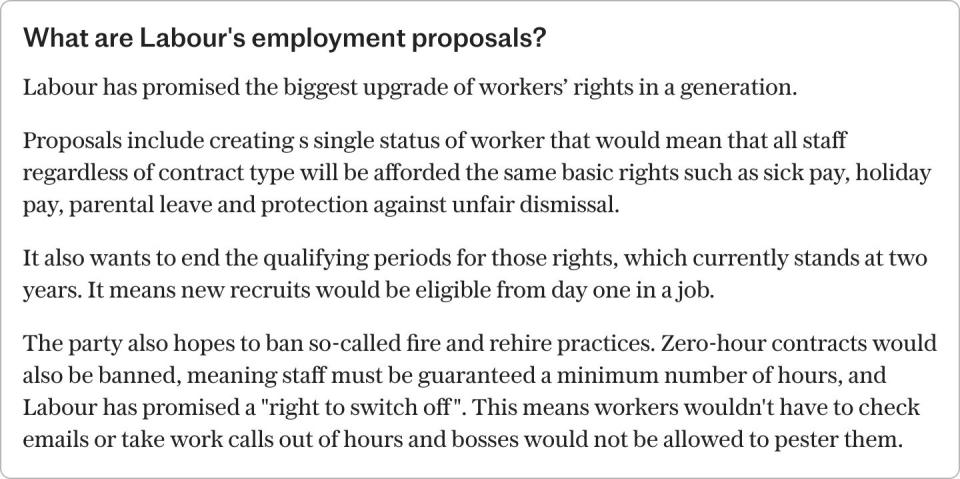As it prepares for office later this year, the Labour Party, and especially its leader Sir Keir Starmer, has been busily trying to reassure corporate leaders that the planned overhaul of employment law will be significantly watered down.
Zero-hours contracts may be allowed to continue, at least with a few extra rights. The unions won’t be invited back in to help run the government, and some of the extra employment rights will be ditched.
No one should be fooled. The most significant reform by far is an extension of collective bargaining agreements. They might sound technical, but in practice they would amount to the Government setting wage rates right across the bulk of the private sector.
And if it happens, it will destroy what little remains of the UK’s once world-leading flexible labour market – and destroy tens of thousands of small businesses as well.
There are plenty of headline-grabbing proposals in Labour’s plans for reform of employment law.
Zero-hours contracts will be banned. Fire-and-rehire will be outlawed. Parental leave will be extended, flexible working will be encouraged, gig work will be regulated for the first time, and there may even be a few fashionable reforms such as “a right to switch off”, a right to “work from anywhere”, and perhaps even statutory sabbatical leave without any loss of pay or employment rights.

They are the kind of reforms that generate plenty of support on social media, and will please the party’s mainly professional, public sector base that is always happy to award itself some more time off so long as everyone’s pay and pensions benefits remain just as generous.
Over the last few weeks, the party has been busily watering down many of the reforms, with pledges for extra legal rights replaced with vague commitments to best practice. The party’s leadership is desperate to keep big business on board as it heads into an election.
According to the Unite union, the latest version of the package is “totally unrecognisable”, while its general secretary Sharon Graham described it as a “betrayal”. The final version of the plan is set to be hammered out over the next few weeks, and we will see what is included in the final manifesto when the general election is called.
It won’t be the headline rights that really matter, however. The meat of the plan will be in the detail. The most significant reform is also the most technical. In its 2021 policy outline, the party committed itself to “sectoral collective bargaining” for the whole economy.
As the law firm Lewis Silkin put it in an analysis of the plans, this is “the single most radical proposal in its 2021 Green Paper”.
What does it mean? In effect, under sectoral bargaining there will be fair pay agreements for every different sector of the economy, hammered out at a national level between the Government, the unions, and employer’s associations.
A nationally agreed wage will be set for, say, dental assistants, or care workers, or engineers, or retail workers, bar staff, and dozens of other everyday roles. If you are running a restaurant in Staffordshire, you will be told what to pay the chef, and a vet’s clinic in Somerset will be told how much their receptionist will be paid.
That will be a radical change for the UK. In this country, only 26pc of workers overall are covered by collective wage agreements, and just 13pc of employees in the private sector (the bulk of them in construction and transport where they have a longer history).
They are more common in some continental European countries, with 99pc of jobs covered in Italy, 98pc in France, and 51pc in Germany, but it is hardly a great idea to try and copy labour systems that have generated permanently higher levels of unemployment, especially among young people.
In reality, it is complete madness to try and micromanage the pay and conditions of 32 million people with jobs in the UK.
There are three huge problems. First, it tries to create one set of national standards for businesses that vary according to local conditions, who their customers are, and what part of the market they serve.
Should the chef at a Michelin-starred restaurant in Marlow be paid more or less than his or her equivalent at a roadside cafe in Derbyshire? Or should a dental technician be paid the same in prosperous Cheshire as in far poorer Wrexham, even though housing and other costs will be wildly different?
Surely not. All we will do is end up setting rates that are completely wrong for everybody.
Next, it will push up wages. Just as the National Living Wage has gone up far faster than inflation, we can be sure the “fair wage” for each industry will keep on rising, especially if Angela Rayner is chairing its meetings.
True, some employers will be able to afford it, but others won’t and they will quickly be put out of business. It is hard to see how that helps anyone. Indeed, the increases in the living wage have already meant some companies have closed down, and the impact of “fair wages” will be even greater.
Finally, it will destroy flexibility. The UK economy has such a long list of flaws that it is hard to keep track of them all, but one of its strengths has been that it has a workforce that can adapt very quickly to changed conditions. By setting rigid, national pay rates, we will throw that away, and anyone who thinks that is an improvement is kidding themselves.
Sure, collective agreements may have worked in the industrial, regimented economies of the 1950s and 1960s. They may even still work in countries far more dependent on industry, such as Germany. They are not going to work in the service-based, entrepreneurial economy of the UK in the 2020s.
In reality, Labour is living in the past – and in trying to get back there will wreck the economy.
Source Agencies

